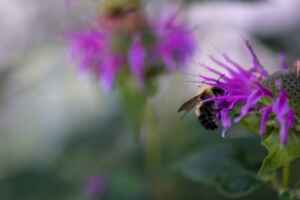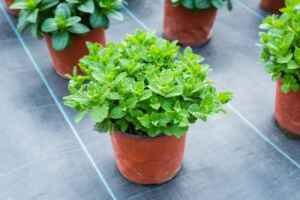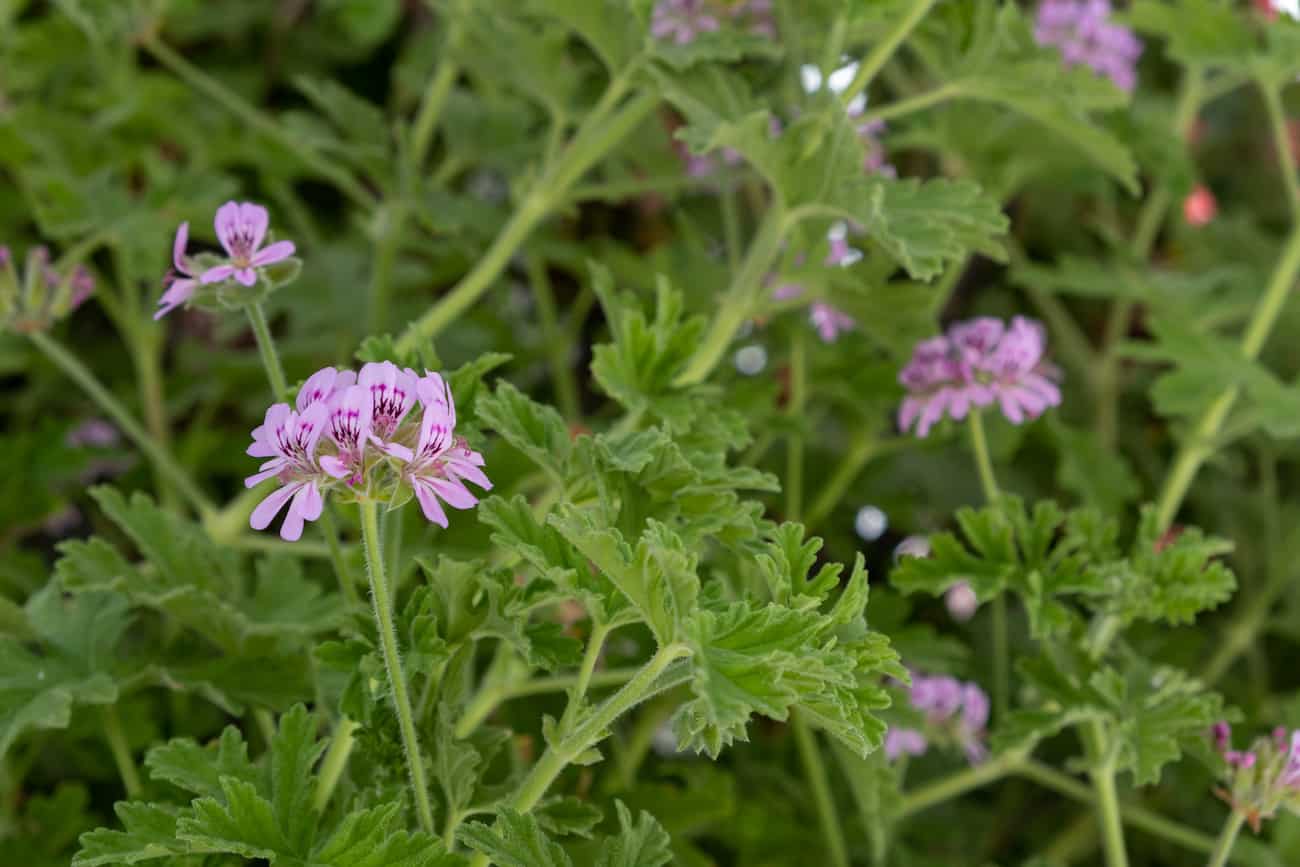Mosquitoes are repelled by plants that emit their natural scents, which keep pest mosquitoes away and offer lovely fragrances to your garden as a whole. If you don’t want to use chemical bug sprays on yourself or in your yard, you can grow some of these plants to help keep mosquitoes naturally. The best plants to keep on your patio are catnip, bee balm, rosemary, and basil. These plants should be scattered throughout your garden so that their scents can be released into the air to effectively repel mosquitoes.
Top 15 Mosquito Repelling Plants
Several plants have been found to be effective at repelling mosquitoes. A lot is being used as essential oils. When grown outside, along with other plants, they repel mosquitos as well. You will have an unbeatable combination in winning the mosquito war and finally have those pest-free gatherings on the patio this summer. Here are the top 12 mosquito-repelling plants:
 Bee Balm
Bee Balm
Bee balm (Monarda) is beloved for its capacity to attract bees, butterflies, and hummingbirds. Although bee balm (Monarda) is also used as a mosquito repellent, it is well-loved for this ability.
- To release the plant’s volatile oils for many insect-deterring plants to work, you have to crush the leaves.
- You can use this plant as a border in your garden or pots on your patio.
- Scent and repellent chemicals are present in the leaves’ aroma. Bee balm is the exception to that rule.
- When it develops and blossoms in your garden, it releases scents that mosquitoes find unpleasant.
The sunflower bee balm is a perennial that has a wide range of blossoms and plant sizes. This delight is Balmy Rose monarda, which is a little variety that grows to a foot tall. It is ideal for bed edging or container gardening.
Floss Flower
This lovely blooming flower makes beautiful bedding or container plants. Floss flower contains coumarin, a mosquito-repelling chemical that is also poisonous if consumed by dogs or people.
Marigolds
Marigold flowers, which are easy-to-grow annual flowers, can repel mosquitoes. These plants are not only beautiful but also useful in keeping mosquitoes away.
- Grow them in pots and put them near your patio or house entrance to keep pests out.
- Marigolds are also used as borders in gardens and vegetable plots.
- They also kill nematodes, which are soil-dwelling pests that damage plant roots.
The strong scent of marigolds is known to repel many types of insects, including mosquitoes. It’s best to plant these flowers in a location where you can enjoy their fragrance.
Catnip
Catnip (catmint) can be found nearly everywhere. It belongs to the mint family and maybe cultivated both commercially and as a weed.
- It is very simple to maintain, and it may even spread to other parts of your garden if you are willing to put up with its sneaky nature.
This plant is a known mosquito repellent. It is said to be ten times more effective than DEET, which is the main ingredient found in many commercial mosquito repellents.
Rosemary
A highly effective mosquito repellent is rosemary. This herb is used in many different dishes and has a strong scent. You can also extract the oil from the plant and use it as a natural mosquito repellent.
- Rosemary is an evergreen herb, so it can be planted in your garden
- It will last for years to come.
- Rosemary is a wild herb that many of us are very familiar with.
It has a woody scent that keeps mosquitoes, cabbage moths, and carrot flies at bay. They thrive in hot, dry conditions and are very drought-resistant.
Basil
Basil is another plant that may be used as a pest repellent. Pest avoidance is aided by the pungent aroma of basil leaves. All sorts of basil keep flies and mosquitoes at bay.
- This herb likes to be kept damp, needs good drainage, and enjoys lots of suns.
- You can plant basil in containers or the garden, alone or with other flowers
- Remember both plants need to meet the same requirements.
Scented Geraniums
Scented geraniums are one of the most visually appealing plants available. They come in a wide range of plant shapes and sizes. The flowers are usually smaller than those on regular bedding plant geraniums.
- Scented geranium leaves release chemicals that pests dislike when crushed or rubbed.
- Citrus mixtures, rose, peppermint, nutmeg, apple, and cinnamon scents are common.
- The lemon-scented types seem to be the most effective at repelling mosquitoes.
These scented plants are lovely container plants. In areas with harsh winters, move your plants indoors for the winter or take cuttings to keep them alive until spring.
 Mint
Mint
Mints are excellent non-toxic alternatives for keeping mosquitoes, flies, and even ants away. The more pungent the aroma, the fewer pests you’ll have.
- It is ideal for balconies and patios since it can be easily reached from there.
- If you want to offer a few leaves in your afternoon tea, you may do so.
- The leaves may also be dried and used inside your home as a natural pest control method.
Sage
Plants can be used to protect you from mosquitoes. While they may provide beauty and interest, plants can also aid in the prevention of disease. When applied as a compress, poultice, or bath wrap, sage is an excellent mosquito repellant.
- By linking fresh or dried sage stems and tossing them into your fire pit or chiminea, you can create a cloud of mosquitoes repelling smoke.
- If you don’t have access to a fire pit, you may burn one end of a sage smudge stick and wave it around to keep mosquitoes at bay.
Citronella Grass
Citronella grass (or lemongrass) is a widely used natural component in mosquito repellents because of its distinctive aroma. The Brooklyn Botanic Garden advises using plants with a lemon scent to keep mosquitoes away.
- The good news is that the living plant is the most effective insect repelling form of citronella.
- You can purchase a small potted plant or grow it from seed to keep on your patio.
Lavender
Have you ever noticed that insects, rabbits, and other animals haven’t damaged your lavender plants despite plenty of attacks? It’s due to their pleasant scents.
- These scents come from the plants’ essential oils.
- Lavender oil is even said to hinder mosquitoes’ sense of smell.
This plant is extremely resilient and drought-resistant once planted, so it’s perfect for gardens in drier climates. It can Iven up a bland colorless patio.
Variegated Plectranthus
Variegated plectranthus has a strong, unpleasant odor that some people find off-putting. Simply brush it lightly or soak the leaves in water to dissipate the scent.
- The odor deters mosquitoes – and a variety of other insects.
- This plant is also known as Madagascar spur flower, Swedish ivy, and mint leaf.
- The felted leaves with a strong odor will tell you whether you have the right one.
Thyme
For example, red-creeping thyme has excellent mosquito-repelling qualities. To elicit the aromatic components, crush the leaves.
- Simply scatter crushed stems across gardens.
- To protect yourself or your furniture, rub the leaves on your skin or clothes.
- Burning thyme leaves provides up to 90 percent protection against skeeters for up to 90 minutes and might be used as an insect repellent.
All types of thyme, including English and lemon thyme, are mosquito-repelling plants. They can be tucked into pots or used to border planting beds.
Eucalyptus
Gray eucalyptus is prized for the beautiful sheen it lends to cut flower arrangements, but it’s also a lovely container plant with low requirements. Gray eucalyptus delivers a distinctive aroma that repels mosquitoes.
- To enhance the bug-repelling properties of warm leaves, bring them to their release temperature.
- Keep plants in full sun or heat leaves to achieve this.
- A fantastic option for containers is ‘Silver Drop’ eucalyptus (Eucalyptus gunnii), which grows 24 to 36 inches tall and 12 to 16 inches wide.
You can even line up several pots to create a living wall of mosquito-deterring beauty. ‘Silver Drop’ is hardy in Zones 9-10; treat it as an annual in other zones.
Lantana
Lantana, on the other hand, serves as an effective mosquito repellent due to its effectiveness against mosquitoes. It smells! When sunlight warms the plants, aromatic chemicals are released by the leaves.
- Lantana is a good choice because it provides between 27 and 42 percent protection from mosquitoes.
- This bug-chasing plant also produces gorgeous flowers that attract butterflies.
It needs plenty of light and water every few weeks. It can withstand poor soil, drought, and heat in planting beds. This is a Luscious Berry Blend lantana.
 Conclusion
Conclusion
All of these incredible plants will add to your mosquito-less summer patio. They will also add to wonderful scent-filled gatherings. Using plants to repel these pests is a good investment. If properly maintained they will be around for years to come. There are a variety of mosquito-repelling plants that you can use to keep your patio mosquito-free.
Citronella, lavender, variegated plectranthus, thyme, eucalyptus, and lantana are all great options. Each of these plants has unique mosquito-repelling properties that make them ideal for use around your patio. With a little bit of planning, you can create a beautiful and mosquito-free patio that you and your guests can enjoy all summer long.

